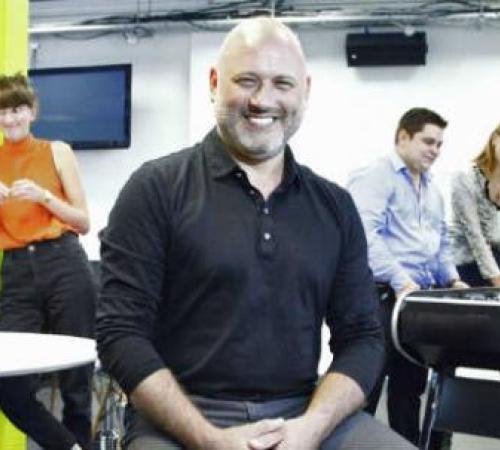
Tech Track 100: How SwiftKey is reinventing QWERTY

The QWERTY keyboard is a quirk of history. As a pragmatic 19th Century solution to the mechanical clashing of typebars on a typewriter, the familiar layout has survived the technological revolution virtually unscathed. Its imperious reign however might finally be under threat from a new generation of tech businesses determined to reinvent the way we type and interact with our electronic devices.
One of those at the forefront of this revolution – and a winner of the Digital Innovation Award at the 2014 Sunday Times Hiscox Tech Track 100 (external link) awards – is SwiftKey (external link). The business brainchild of two Cambridge University graduates – Jon Reynolds and Ben Medlock – SwiftKey’s keyboard app now boasts upwards of 250 million users, and revenue growth from £0.3m in 2010 to millions today.
Given the explosive growth of SwiftKey, when did Jon Reynolds, CEO and co-founder, realise they were on to something? “Ben [Medlock] and I always believed that we had an idea that could change the way the industry viewed text input, but this became especially clear when we attended Mobile World Congress in 2010.
“The plan was to attend with a prototype and try to speak to potential customers who could manufacture our software. But the response was bigger than we imagined, partly because Android was really beginning to take off – it [Android] had around 1% market share when we started out.
“We knew launching an app would be the best way of proving the concept – to manufacturers and to users. Getting 50,000 downloads on the first day really confirmed our belief that there was a growing demand for personalised and customisable technology. Several years on and our technology is now on 250 million devices.”
Swift growth comes with challenges
SwiftKey’s app essentially learns how users type to speed up text prediction on smartphones and tablets, with the company estimating that it has saved its users over a trillion keystrokes. Now available in over 80 languages and a bestseller in 58 countries, its rapid growth hasn’t come without its challenges which included building partnerships with large original equipment manufacturers (OEMs), and trying to move from an ‘early adopter’ product to mass market.
There is also the company’s fast rising headcount which has seen it grow from 50 to 150 employees, as well as the decision for Jon to move across the Atlantic to an office on the US west coast. “We knew that this would be a big change – and culture shock – but we also knew that it was something we needed to do in order to capitalise on the momentum we’d built with the launch of SwiftKey Keyboard on Android. Being in Silicon Valley has brought us closer to key partners, investors and influencers. We knew that putting ourselves in the heart of the global technology scene would also help us stay ahead of trends and establish ourselves as an industry leader,” says Jon.
“Splitting my time between the UK and Palo Alto [co-founder Ben Medlock and the majority of the team remained in London] and adjusting to this big change has posed some challenges for us – lots of meetings on Google Hangouts, working on aeroplanes and many early starts. Managing a business across continents and time zones is definitely tricky, and we are constantly learning how to scale to our new numbers – in both staff and user base – and adjusting the way we work to reflect this.”
Civil servant or entrepreneur?
Starting up during a recession is also probably not high on the list of the entrepreneur’s ‘how to do it’ guide, but SwiftKey has managed to successfully navigate the choppy waters. “Leaving my job in the civil service in 2009 was a huge choice – after all, who leaves a secure job during a recession when you’ve only just graduated from uni?
“But at this point, Ben and I had both logged months of work on the idea behind SwiftKey and were excited by its potential. However, it was seen as a ‘brave’ thing to be doing – starting your own tech business wasn’t as mainstream then as it is today.
“We started out working out of our flats and out of the Southbank Centre, which was great because it had free wi-fi. Our first vote of confidence came from the Technology Strategy Board, which supports innovation in the UK. They gave us our first funding in the form of a series of grants totalling £75,000. To this day we’re really grateful there are organisations set up to encourage start-ups in the UK.”
Start-up secrets of success
For other tech start-ups who might be looking on enviously at SwiftKey’s success, what is the secret? “I think it comes down to a combination of luck, great timing and agility as a company,” says Jon. “When we launched, Android was brand new with a small market share and that gave us an opportunity to make our mark early and demonstrate to the industry that better typing was something many millions of people wanted.
“We are also incredibly focused on keeping a culture of innovation at the heart of the company, and staying agile. We’re in an industry that is constantly evolving and being able to keep up with – or ahead of – those changes is critical.”
As the new kids on the block, SwiftKey hasn’t however been afraid to learn from the tech establishment comments Jon: “I’ve really enjoyed learning from more established entrepreneurs. I recently attended a conference where I heard both Apple’s Tim Cook and Alibaba’s Jack Ma speak. Their stories are so different but I took useful insights from both – from Cook, the beauty of building one type of product better than anyone; from Ma, the power of having a huge vision and an ambition to change the world.”
Single minded
It’s that single minded vision which Jon believes continues to guide the success story of SwiftKey. “We’re very focused on continuing to innovate and investing in our product leadership, and try to keep that mission front and centre every day. Things have changed a lot from when we started. There are definitely a lot more balls in the air, especially now that we have expanded globally with offices in San Francisco and Seoul. But we’re really clear on where we’re going – we want to make it easy for everyone to create and communicate on mobile and I feel really inspired by our vision that your device should learn from and adapt to you as an individual, not make you adapt to it.”
And if there is one piece of advice that Jon would offer to a start-up? “Keep it simple. Since founding SwiftKey nearly seven years ago with Ben, I’ve realised that being really clear about exactly what problem you’re solving and how you’re solving it is paramount. Don’t focus on unnecessary additions – simplicity is key.”
Disclaimer:
At Hiscox, we want to help your small business thrive. Our blog has many articles you may find relevant and useful as your business grows. But these articles aren’t professional advice. So, to find out more on a subject we cover here, please seek professional assistance.




